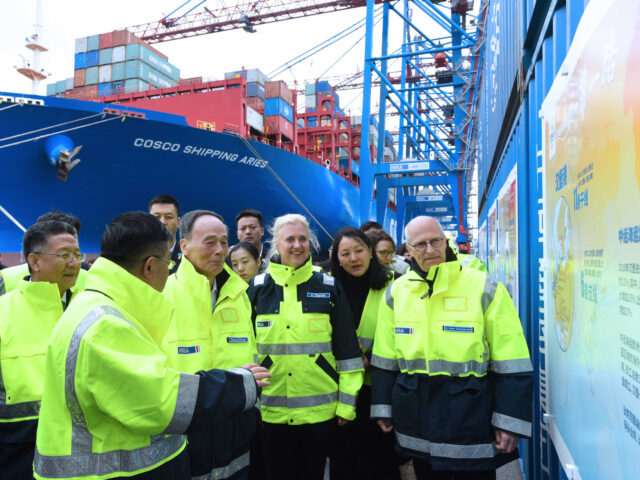The left-wing government of Chancellor Olaf Scholz has approved the controversial sale of a stake in the port of Hamburg to a Communist Chinese state-owned shipping giant, despite warnings from Germany’s intelligence community on becoming over-reliant on Beijing as it previously did with Moscow.
The German government appears intent on continuing the cosy relationship with China developed under former Chancellor Angela Merkel, with the cabinet of Olaf Scholz’s traffic-light coalition government approving the sale of a 24.9 per cent stake in Hamburg’s shipping container terminal to state-owned COSCO Shipping. The quarter stake is seen as a compromise from Scholz with other members of the coalition government, including the Greens and the FDP, which opposed the deal when it was originally set for a 35 per cent stake.
While proponents of the deal to sell off part of Germany’s largest, and Europe’s second-largest port have argued that the sale of the stake will give Germany a competitive edge in courting Chinese trade, it has caused consternation and concern among others, including cabinet members such as finance minister Robert Habeck, according to German public broadcaster Deutsche Welle.
A briefing note produced by Germany’s foreign ministry also took aim at the deal, warning that it “disproportionately expands China’s strategic influence on German and European transport infrastructure as well as Germany’s dependence on China.”
The warning also pointed out that under the terms of the agreement, China could possibly be allowed to take over part of the port for itself during an emergency, threatening the security of Germany and Europe.
Europe Minister of State Anna Lührmann added: “On behalf of the Foreign Ministry, I point out the considerable risks that arise when elements of European transport infrastructure are influenced and controlled by China – while China itself does not allow Germany to participate in Chinese ports.”
The head of the German Institute for Economic Research (DIW) think tank, Marcel Fratzscher also blasted the deal, saying”The German government is repeating the mistake of many previous federal governments” by prioritizing “short-term economic interests over long-term prosperity and prosperity and stability.”
Germany’s dependence on China — now its largest trading partner — makes it incredibly vulnerable to a future east-west trade war. https://t.co/vLx3uJtkWu
— Breitbart News (@BreitbartNews) August 12, 2022
The announcement of the deal comes just days before Chancellor Olaf Scholz is set to become the first Western leader to visit the communist country following the outbreak of the Chinese coronavirus. It is likely that the Social Democrat chancellor will be travelling alongside a delegation of business leaders from Germany in the hopes of further deepening trade relations between the two countries.
Under his predecessor, Angela Merkel, Germany saw economic ties with China flourish, resulting in Beijing becoming Berlin’s top trading partner in 2018. Major German companies, such as BMW, Volkswagen, and Hugo Boss among others have been accused of profiting from the use of forced labour in the Xinjiang region of China, where millions of Muslim Uyghurs and other ethnic minorities have been reportedly interned in modern-day concentration camps.
The level of integration with China has led intelligence chiefs to warn the government that it is in danger of falling into the same trap as it did with its over-reliance on Russian gas, which following tensions over the war in Ukraine has resulted in an energy crisis in the European country.
Last week, the head of the Federal Intelligence Service (BND) Bruno Kahl said that with a “globally ascendant autocratic China,” Germany “must be prepared for the fact that … economic levers could be used to enforce Chinese ideas. Should there be differences in the political views of Germany on the one side and China on the other, then these means will also be used.”
For China, the acquisition of a partial share in Germany’s largest port only adds to the growing list of European ports under their influence. Chinese dictator Xi Jinping’s Belt and Road global domination strategy has seen Beijing acquire ownership stakes in ports in Belgium, Greece, Italy, and the Netherlands in order to increase its trading power over Europe.
Fool Me Twice: German Intel Warns ‘Naive’ Govt Against Falling Into Trap of Over-Reliance on Chinahttps://t.co/3eNr6myxYn
— Breitbart London (@BreitbartLondon) October 19, 2022
Follow Kurt Zindulka on Twitter here @KurtZindulka

COMMENTS
Please let us know if you're having issues with commenting.